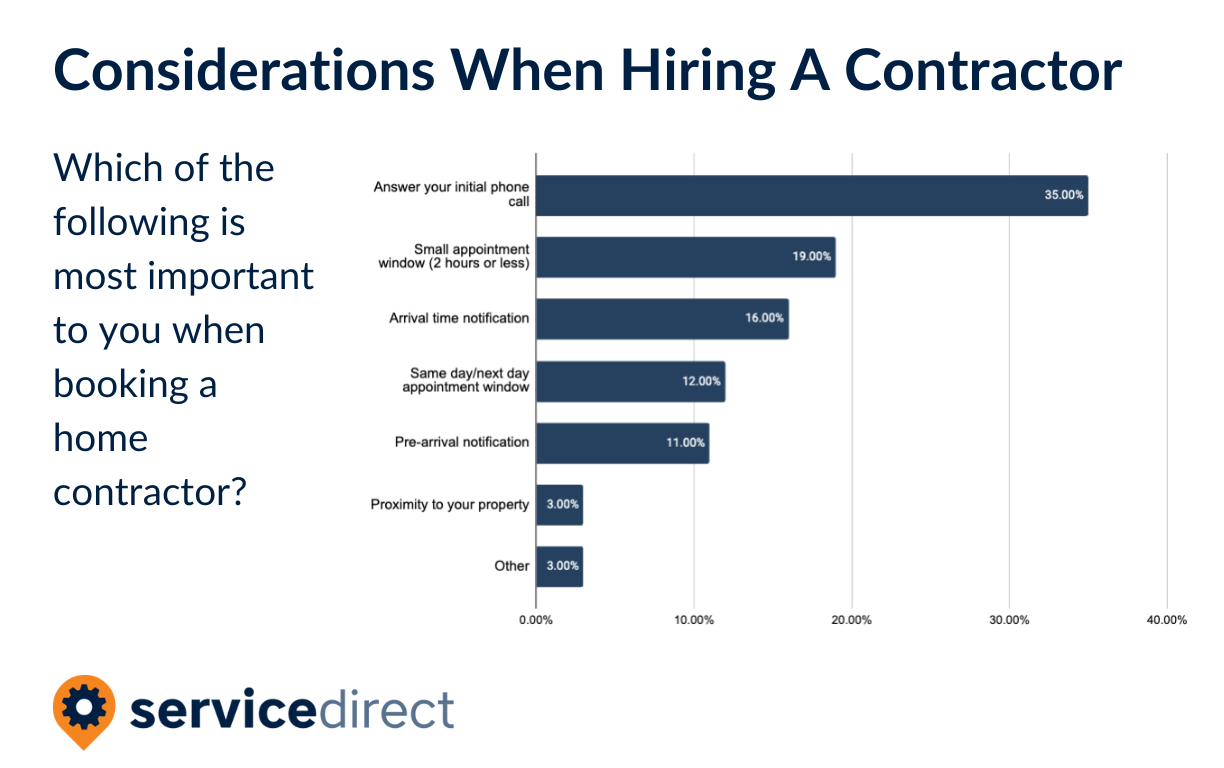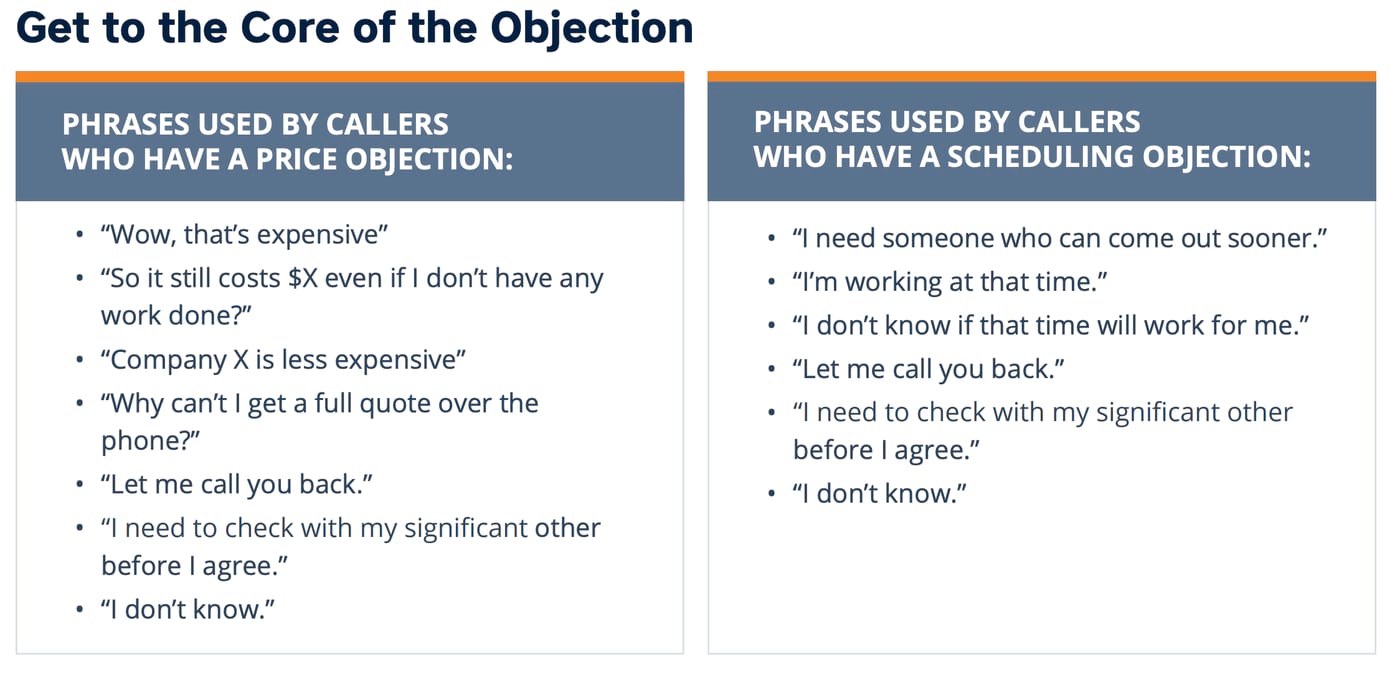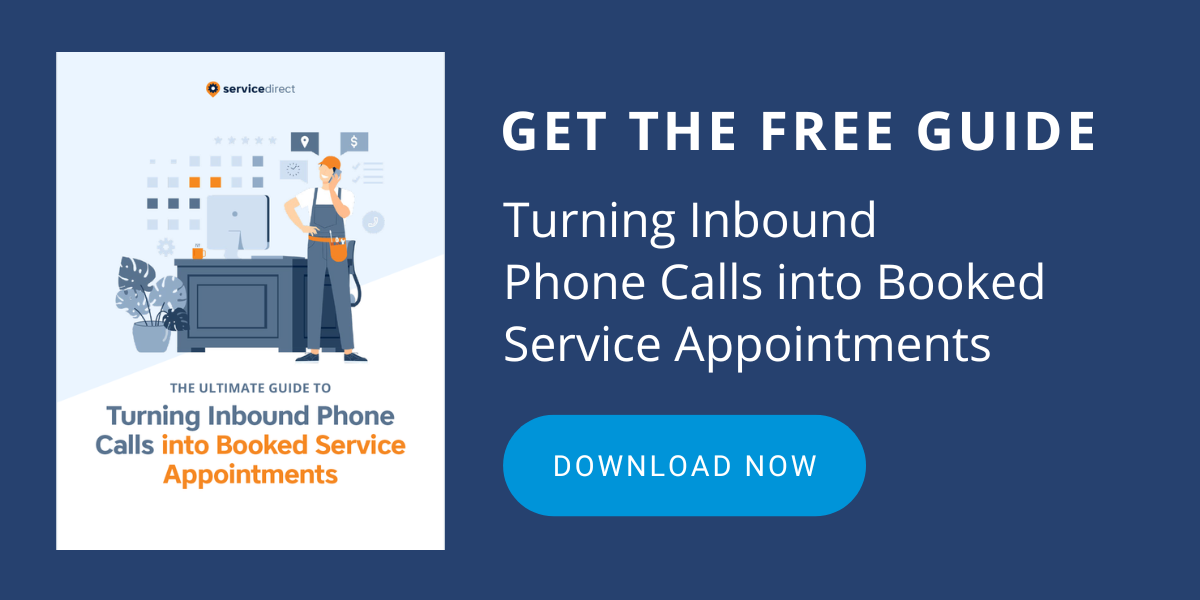Overcoming Customer Objections on the Phone
Every ring of the phone in a small home services business is an opportunity. It's the sound of a potential customer reaching out, expressing interest in your services, and opening the door to a new business relationship.
Small businesses face unique challenges when it comes to closing on potential deals over the phone. Unlike larger corporations with dedicated sales teams, small businesses often have limited resources and staff multitasking in various roles. This often leads to call takers not being adequately prepared for objections and hesitations from potential customers. However, with the right strategy, small businesses can excel in this crucial aspect of their operations.
In this article, we'll explore the importance of overcoming objections during phone calls for small home services businesses. We'll delve into the importance of building trust quickly, the core concerns fueling the most common objections, and practical strategies to address objections effectively.
The Importance of Converting Phone Calls
In the world of small home services businesses, customer interactions often begin with a phone call. There are few better opportunities for a small business than an incoming phone call from an interested potential customer.
That’s why mastering the art of converting these inbound calls into paid service appointments is essential. Each one could become a high-paying job that leads to a years-long customer relationship.
In order to make that potential a reality, however, you must answer your phone. As simple as that sounds, it’s worth noting that 64% of homeowners say that answering their initial phone call is important when they’re choosing a contractor, and 35% said it is the most important thing in making that decision.

Once you’ve answered the call and made a solid first impression, it’s time to turn that phone call into a booked appointment. This process isn't just about having a great sales pitch – it's about building trust, demonstrating value, and turning objections into opportunities.
Building a Foundation of Trust
Before you can successfully address customer concerns, you’ll need them to trust you. Otherwise, no matter how you try to deal with the objections they may raise, doubt will still linger in the back of their mind, and you’ll likely lose the sale.
Creating and sharing compelling content like client testimonials and customer reviews is a great way to proactively start building trust. Potential customers can find these on their own via your website, and they also make great sales tools, so be sure to have some on hand when taking calls.
Building trust exclusively over the phone can be tricky, but it’s far from impossible. Remember that the caller has a problem or issue that needs to be resolved, and they think you’re company might be able to help. Listening, empathizing, and asking relevant, insightful follow up questions are all critical skills that can go a long way toward building caller trust and confidence. This will help deal with any objections or hesitations they may have and close the sale.
Little things like asking the caller’s name and using it throughout the conversation and acknowledging the difficulty of their situation and the frustration they must be feeling can be surprisingly effective at building rapport and creating trust.
Understanding Common Objections
Oned of the biggest benefits of phone calls is that they allow for instantaneous two-way communication. The business get to tout their great services, the customer gets to respond with concerns or questions, and the business representative gets to respond to those concerns, all in a matter of moments. That means anyone at your company who might be fielding incoming phone calls had better be prepared to respond to some common objections keeping potential customers from making a decision.
Home services business typically start with just such a conversation via phone. This is also an industry where most of the work is typically performed at the client’s location. In these cases, there are two primary objections a call taker might hear:
- Price: The cost is too high against the perceived value of the service.
- Schedule: The service is not convenient enough and the customer wants more control over this process.
It’s often very easy to identify which core objection you’re dealing with as a call-taker. However, there are times when the customer obscures their main concern. Whether they’re embarrassed or not totally sure what their exact concern is themselves, there are always indicators that will help you get to the core of their objection.
For example, the phrasing of the objection might hold some clues. Here are some common phrases you’ll hear from callers with price or scheduling objections.

You may have noticed that some of these phrases can go either way. When the core objection isn’t obvious, it’s up to the call taker to ask the right follow-up question to determine the exact cause of the hesitation.
For example: “Are you worried about whether or not the time will work, or are you concerned about the price/service fee?”
Objections May Be an Unaddressed Need
While listening to the caller’s objection, it’s important to remember how the conversation started: a potential customer called you because they have a problem and they are hoping you can fix it.
An important first step when handling an inbound call is making sure you do, in fact, offer the service the caller needs (get the full step-by-step process in our Ultimate Guide to Turning Inbound Phone Calls into Booked Service Appointments). So at this point in the conversation, you should already be certain that your business is capable of resolving the caller’s issue at a fair price. So why are they still resisting making the appointment?
In most cases, this is a clear indicator that the caller is still doubtful that they reached the best option for solving their problem.
Call takers need to be ready to make a strong value statement that reassures the caller. Confirm that their property is within your service area, bring up your company’s experience with similar issues to theirs, and explain how the value of your service stacks up against your competitors.
How to Address Common Objections
Dealing with objections from callers is a critical skill for call takers at small service businesses. Addressing these concerns effectively will give the caller confidence that they’ve reached the right company to solve their problem and increase your business’s call conversion rate, brining in more business.
So, how exactly do you overcome the common objections we’ve covered?
RESPONSES TO PRICE OBJECTIONS
A price objection stems from a disconnect between the potential customer’s perceived value of the service and the pricetag. Overcoming this type of objection usually means reiterating the quality and value of your service.
Here are a few examples of how you can put this into practice:
Caller: “The price is too high.”
Call taker: “I understand that you are watching where your money is going, let me tell you about the benefits of choosing our company….”
Call taker: “I’m glad to see that you are someone who appreciates good value, let me tell you about what you’re getting when you choose us…”
Caller: “Can you give me a price quote over the phone?”
Call taker: “We don’t provide full quotes over the phone like some other companies, because our customers tell us that they have had those companies give very low estimates on the phone and then once they get there, the price changes and it’s too late or too much trouble to send the technician away. We want to lay eyes on the situation and only provide an air tight quote that will not change. Anyone who provides a phone quote is just guessing and cannot guarantee what it will actually cost in the end.”
Call taker: “I know finding the best deal is important to you and I hear you saying that you are going to call a few more places either way, but I want to be sure you get your first choice of appointment times so what if we go ahead and put you on the schedule now, and if you find a better deal later, you can always call back and cancel.”
RESPONSES TO SCHEDULING OBJECTIONS
Where dealing with price objections can feel like reiterating a sales pitch, addressing a scheduling objection is more about being flexible. Be willing to wait while they discuss with a significant other or check their calendar, but try to stay on the line rather than letting them call you back. If they insist on calling back later, suggest getting them on the books first as a placeholder, and then if that time doesn’t work, they can call back and reschedule.
Here are a couple of scripts that illustrate how to handle scheduling objections:
Call taker: “We want to provide service in a time frame that works for you. If X doesn’t work for you, what time/day would be better?”
Call taker: “We know your time is valuable which is why we have a short appointment window of X hours and always call when the technician is on their way to your house so you don’t have to stay home all day.”
Call taker: “I know finding the ideal time is important to you and I hear you saying that you are going to call a few more places either way, but you may find calling around that no one has a sooner appointment available, so what if we go ahead and put you on the schedule now, and if you find a better appointment later, you can always call back and cancel.”
Conclusion
In the world of small home services businesses, success hinges on the ability to convert potential customers into loyal clients. Each inbound phone call is a precious opportunity, and your ability to handle objections effectively can make all the difference.
In this article, we've discussed the value of each incoming phone call, the significance of trust, and the art of empathetic objection handling. We've covered how to identify the core objections of pricing or scheduling and offered clear and effective responses to these common concerns.
By mastering the art of objection handling on the phone, you're not just addressing hesitations and concerns; you're building lasting relationships with your customers. You're proving your worth, demonstrating your dedication, and turning objections into opportunities for growth. It's not just about closing a deal; it's about nurturing a connection that can lead to repeat business and glowing referrals.
So, as you pick up that ringing phone, remember that it's not just a call. It's a chance to showcase your expertise, your dedication, and your commitment to satisfying your customers. Embrace objections as stepping stones, not stumbling blocks, and watch your small home services business thrive.




